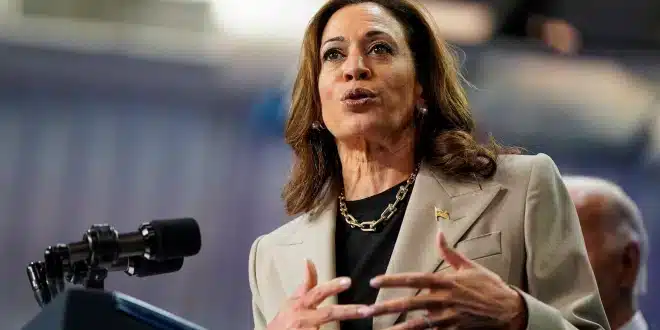Kamala Harris laid out her vision for an “opportunity economy” on Friday, proposing tax cuts for most Americans, measures to curb “price gouging” by grocery stores, and initiatives to expand affordable housing, should she win the presidency.
In her first major economic address as the Democratic presidential nominee, Harris pledged to introduce a new child tax credit of up to $6,000 for families with young children, reduce taxes for families, and lower the cost of prescription drugs.
She also proposed building 3 million new housing units over the next four years and offering tax incentives to homebuilders focused on creating homes for first-time buyers.
Speaking to supporters at a rally in North Carolina—a key state in the upcoming November 5 election—Harris acknowledged the strength of the U.S. economy but emphasized that prices remain too high. As president, she said she would prioritize the middle class.
“Together we will build what I call an opportunity economy,” Harris said. “Strengthening the middle class will be a cornerstone of my presidency because when the middle class is strong, America is strong.”
However, her proposals may face challenges from both corporate interests and Congress, which has previously rejected similar ideas from President Joe Biden.
Harris, who plans to reveal more details of her economic agenda in the coming weeks, is positioning herself in contrast to her opponent, Republican Donald Trump, especially on issues like tariffs and taxes. Trump has proposed a new round of broad tariffs on imports—a move Harris opposes.
“He wants to impose what is effectively a national sales tax on everyday products and basic necessities that we import from other countries,” Harris said. “That will hurt Americans.”
She added that this would mean higher prices on essentials like gas, food, clothing, and over-the-counter medication—a “Trump tax” on everyday life.
In response, Trump’s economic advisers Kevin Hassett and Stephen Moore argued that Harris’ proposals would worsen inflation and harm the economy. They criticized her plan to offer up to $25,000 to first-time homebuyers, saying it would only drive up home prices.
Republicans have blamed Biden and Harris for rising prices and inflation, but Harris aims to address these concerns by appealing to a broad segment of working Americans who often view Republicans as better on economic issues.
Some of her policies, including those related to housing and groceries, have faced criticism as overly populist from Republicans and some industry groups.
The nonpartisan Committee for a Responsible Federal Budget estimates that Harris’ economic plan would increase deficits by a net $1.7 trillion over a decade, with that figure potentially rising to $2 trillion if temporary housing policies were made permanent.
Harris’ plan includes a federal ban on price gouging in the food and grocery sectors, targeting large corporations that exploit consumers for excessive profits. She would empower the Federal Trade Commission to impose strict penalties on companies violating these new price gouging limits.
“I know most businesses are creating jobs, contributing to our economy, and playing by the rules,” Harris said. “But some are not, and that’s just not right. We need to take action when that happens.”
While progressive economic ideas often poll well with voters, they have proven difficult to pass into law. Most of Harris’ and Trump’s economic priorities would require majority support in Congress. For instance, a child tax credit bill passed the House of Representatives but stalled in the Senate this year.
Harris’ plan also includes tax incentives and other measures to encourage the construction of homes for first-time buyers, along with a $25,000 credit for such buyers. Additionally, she aims to expand rental assistance, ban rent price-fixing, and prevent Wall Street firms from buying homes in bulk.
She is also focused on reducing healthcare costs, canceling medical debt, and highlighting the Biden administration’s efforts to lower the prices of 10 top-selling prescription drugs used by Medicare by as much as 79%.
Harris has maintained Biden’s commitment not to raise taxes on individuals earning $400,000 or less annually. Her campaign seeks to contrast this with Trump, who reduced the corporate tax rate from 35% to 21% and introduced other tax breaks set to expire next year. Trump has promised to make those tax cuts permanent.


